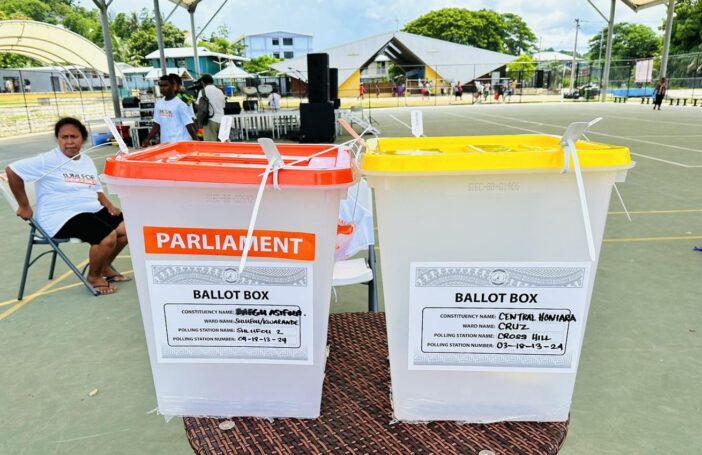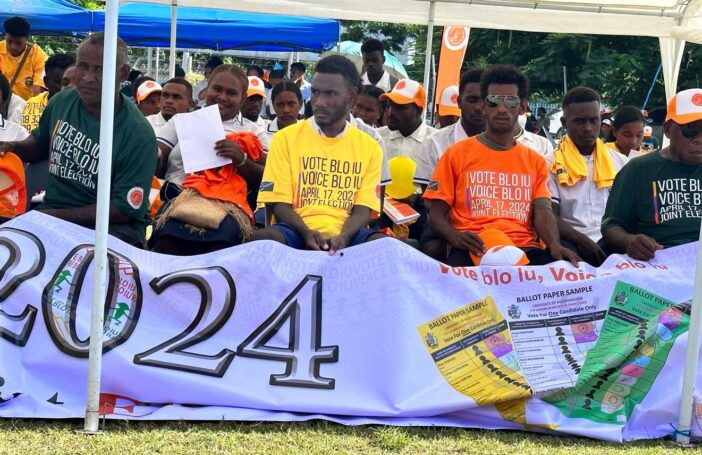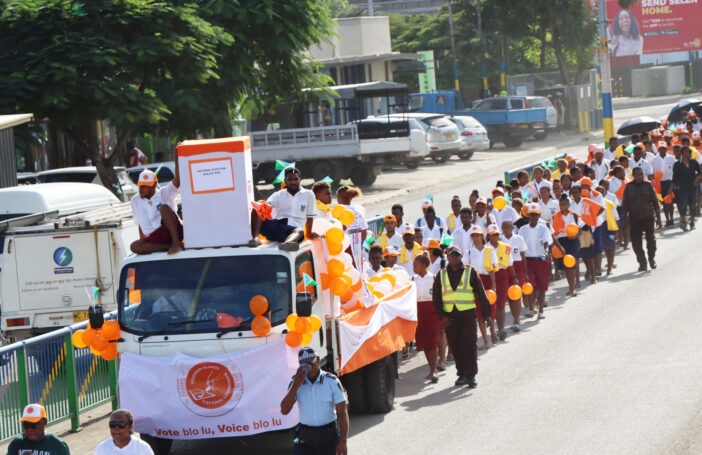Polling is over in Solomon Islands. There might be recounts. And there will certainly be electoral petitions in which losers challenge results in court. But that’s all for the future. For now, results have been announced for all 50 of the country’s electorates. And the MPs-elect will be the people who choose the country’s next prime minister.
If you’re looking for a clear winner from the elections the only person I can think of is David Hegarty. Hegarty is the Australian academic who first identified the relationship between candidate numbers and election outcomes in Melanesia. As I wrote previously, Hegarty’s Law suggested more MPs would lose their seats in 2024 than had been the case in 2019 or 2014. It also appeared to indicate that 2024 wouldn’t be a good election for the Ownership Unity and Responsibility (OUR) party led by Prime Minister Manasseh Sogavare either.
I wasn’t brave enough to make any confident claims at the time, but it turns out that Hegarty’s Law predicted the overall 2024 outcomes almost perfectly. Only 52% of sitting MPs who defended their seats managed to win, and 18 of the 32 MPs who entered the election under the OUR party banner were defeated. (Interestingly, the law didn’t perform well in predicting individual electorates. When I ran regressions looking at electorate-level results there was no relationship. Nevertheless, it got overall results patterns right.)
Why was 2024 such a bad election for incumbents, and OUR party incumbents in particular?
I don’t want to disappoint anyone, but there’s no evidence that Solomon Islands’ voters spurned the OUR party because its leader had become too friendly with China.
It’s certainly true that the OUR party had a very bad election. However, although the Solomon Islands Development Party (SIDP) and the United Party, led by Sogavare’s main rivals in national politics, Matthew Wale and Peter Kenilorea Jr, did manage to win new seats, they also saw 40% of their sitting MPs lose. The biggest winners in the election were independent candidates, who were elected in large numbers, despite having no track record regarding China.
And then there’s Malaita. The province was supposedly the home of the most fierce anti-Chinese opposition in Solomon Islands. Led by its firebrand anti-China governor Daniel Suidani, Malaita refused Chinese aid projects. And Malaitan protesters are said to have sparked the anti-Sogavare riots in 2021. Yet as you can see in the chart below (Figure 1), which shows the performance of OUR party incumbents across provinces, half of the OUR party’s incumbents won their seats back in Malaita. Not great, but actually better than their performance nationally.

Suidani was re-elected to his ward seat in the Malaitan provincial government. But even in Fataleka, where he is from, anti-OUR party sentiment can’t have been that strong. Rexon Ramofafia, the sitting Fataleka MP in the national parliament and member of the OUR party, won 66% of the vote, handily dispatching his challenger from Suidani’s Iumi for Change party. Next door in Baegu/Asifola the race was closer, but OUR party MP Tagini Makaro still beat Iumi for Change candidate and anti-China propagandist, Celsus Talifilu.
I’m sure a small minority of voters in Solomon Islands did vote with China on their minds – and who can blame them, China’s presence in their country isn’t benign – but the evidence really doesn’t fit with the hypothesis that the poor performance of the OUR party was driven by voters’ dislike of China.
If it wasn’t China, what was it then? The likely answer is much more prosaic: material circumstances. Solomon Islands’ GDP per capita has contracted considerably in recent years. (I’m grateful to Jon Fraenkel for pointing this out.) And historically, there has been a relationship between economic performance and incumbents’ electoral fortunes (see Figure 2). What’s more, Constituency Development Funds (CDFs) – the largely government-funded pots of money MPs can spend as they please – appear to have fallen in real per capita terms, whereas previously they had been increasing rapidly. (I say “appear to”, as getting good data on CDFs is hard.) As a result, voters’ lives have been getting harder, while the ability of MPs to help their supporters has become less.
Voters in Solomon Islands are pragmatic. They have to be: they live challenging lives with little convenience or material comfort. And so, with lives getting harder, and with MPs less able to help them directly, they chose to punish incumbents. The effect was probably stronger for OUR party MPs because their party, and its leader in particular, was the face of the government.
This wasn’t universal – some OUR MPs still won – because local personalities and connections are crucial to competition in individual electorates. If you’ve got clan, community or church leaders on your side, sometimes it doesn’t matter which party you’re from. However, economic circumstances almost certainly explain why incumbents and OUR party politicians did so poorly overall in 2024.
It’s not as exciting as imagining Solomon Islands’ voters as foot soldiers chasing China out of the Pacific. But that’s the reality of the country’s politics.
The other reality is that elections never directly determine who will be prime minister. That’s decided in the murky days or weeks of negotiation post-election. In my second post-election blog, I’ll look at the possibilities.
You can download the data here.
This is the first of two posts by the author on the election results and the fourth in a series on the 2024 Solomon Islands elections.





Australia may have been envious of Solomon Islands opening up to China. But look: Australia’s major economic trading partner including the United States of America and others love China because of its sizeable population. Playing double-standards and dirty geopolitical games on Solomon Islands and the Pacific. Our Party maybe voted out or not but they did ruffled the feathers of the Bloodthirsty American Eagle when the courted China and made Australia “weeping” like a toddler seeking aid from its staunch allies. China’s footprints were already established in Solomon Islands and very soon their economic tentacles will grip the Pacific Family. Now, The Pacific Beat with China.
This election was more about health and education than China. The DCGA ignored and underfunded health in favor of the Pacific Games. The turn over of incumbents shows voters want change including leadership that addresses social programs. Throughout the campaigning and horse trading containers full of medicines and medical supplies have continued to accumulate on the wharf awaiting the Ministry of Finance to pay for their release. Nothing new, an ongoing issue that needs to be addressed.
China may represent development through its grants, loans and construction but that is simply another form of cargo cultism that will more than likely fail to change the on going aid dependency in the country and region.
There was a clear mood for change among Solomon Islander people on my several visits there last year. Moving around Guadalcanal, Western, Honiara I encountered few if any people who thought that the current government was performing well. Ambivalence or mild opposition to the government were probably the most common reactions.
My sense from my visits was that these feelings were mainly driven by economic and social factors. Economic factors much as Terence describes, while social factors are in part driven by that economic weakness and also by the continued fear of recurrences of violence.
There is such a wide spectrum of feeling on China that it would be hard to discern any trend that might arise out of it. While many people are still unhappy about the process (or lack thereof) behind the switch, that’s not the same thing as being hostile to China. Some people are hostile, worrying about its influence on the country’s Christian and democratic traditions. Many are indifferent, while others see the opportunities that come both from China and from the international competition that has arisen.
So for me the question has been whether the mood for change was sufficient to overwhelm the bounce that came from a successful Games (and there surely would have been one) alongside Mr Sogavare’s political tenacity and the power of incumbency.